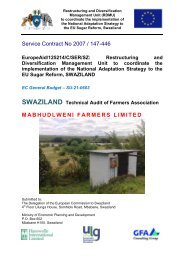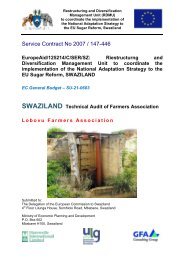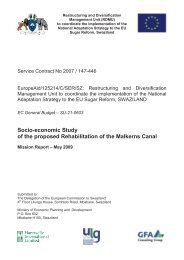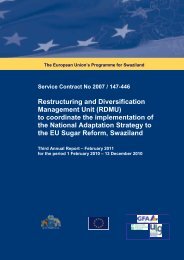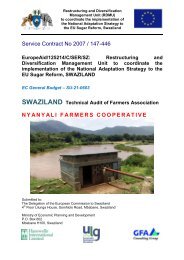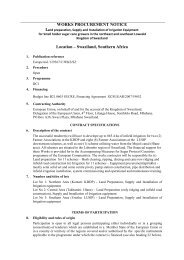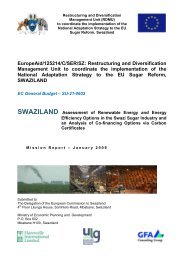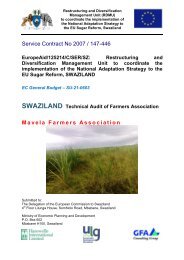- Analysis to determine risk/trends at organisational level as they relate to the sugarindustry (e.g. statistical projections, Health Impact Assessments, research projects),including an analysis of stakeholder response to the possibility of risk. The effects ofpossible changes need be assessed, such as reduction in smallholder projects,mechanisation, and introducing different irrigation systems to reduce employmentrequirements and/or to alleviate the workload of those who are ill.- In any analysis of the HIV/AIDS situation, it is critical to consider issues of gender,particularly as studies have shown that women and girl children are most vulnerableto infection. Concerns include high levels of violence against women and girl children,including sexual assault and rape, linked to HIV/AIDS 49 .- Mainstreaming HIV/AIDS in all activities, not only in sugar companies but also in theout-grower schemes. This will involve co-ordination of tasks and collaboration of effortin HIV/AIDS between all bodies operating within the industry – private, governmentaland non-governmental, drawing on what is currently being undertaken, filling anygaps and ensuring no repetition.- Greater investment in health services impacting on the sugar industry, with extendedoutreach in communities, and particularly to small-scale farmers. All service providerswithin the industry need follow standardised national protocols, in order to ensureadequate training of health providers and adequate treatment at all levels of thehealth care delivery system.- Placing emphasis on VCT programmes, for the industry and those affected byHIV/AIDS within it, to be able to manage the disease; through knowing their status,workers can receive treatment timeously and effectively. According to the <strong>Swaziland</strong>Demographic and Health Survey (SDHS), the percentage of the adult population whowere tested for HIV and knew their results in 2006 was 22% for women and 9% formen 50 . Although the health service is currently stretched beyond capacity, in order toraise the number of people who know their HIV status, the MoH has been involved inincreasing HIV testing and counselling services at health facilities, utilising mobileoutreach services in the workplace, and including rural communities in VCT 51 .Supplementary to this, through the Global Fund the MoH makes ART available tomost in need.- FAs to include aspects of HIV/AIDS-related organisational policies adopted by theprivate sector; for example, where those medically unfit are given light-duty tasks ortrained to undertake other (newly created) activities.- Implementation of AMS 16001, or a similar system based on South African NationalStandards (SANS) 16001/<strong>2007</strong>, across the industry. The impact on the workplacefrom high infection rates necessitates the management of HIV/AIDS as a risk to49 Analysis of the Gender, Sex and Power Relations: The Relationship with HIV and AIDS, in: Sekunjalo: ImplementingCEDAW for National Development. Volume 1, Issue 2. January 2009. Cofunded by the UNDP and the EU, Sekunjalo is anewsletter that details the activities of the gender programme within the Gender Coordination Unit (GCU), Ministry ofHome Affairs.50 Central Statistical Office (<strong>2007</strong>).51 An article on 11 May 2010 (PlusNews) stated that, although mobile clinics for HIV patients have been benefitingcommunities in rural <strong>Swaziland</strong>, “tight budgets have scuppered plans to expand, or even sustain a fleet of just twovehicles” according to a representative of <strong>Swaziland</strong> Positive Living (SWAPOL), an NGO that provides mobile clinicsdonated by UNICEF. In theory, mobile clinics are unnecessary because the MoH’s goal of having a medical clinic within 7km of every dwelling has been achieved for about 95 % of the population. However, this can mean travelling for severalhours, particularly difficult for ill patients – and many people cannot afford the bus fare, leading to people defaulting fromtaking their ARV medication. According to the UNDP, 80 % of rural Swazis live in chronic poverty, and on average it takesthem two hours to reach a clinic.RDMU (<strong>Strategic</strong> Environmental Assessment of the National Adaptation Strategy) - Page 86
sustainable business. Based on ISO 14001, on the premise that risks to employeesand the environment occur owing to processes from within the business, AMS 16001focuses on the risk of employees becoming infected at work. However, the majority ofHIV transmissions occur outside the workplace. SANS 16001:<strong>2007</strong> has beenintroduced to improve HIV/AIDS management in the workplace, and can beimplemented in all workplace environments, including public, private and NGOsectors 52 . The standard consists of a set of absolute requirements for achievingspecific outcomes through actions in line with the currently accepted best practice.For certification, these outcomes are objectively verifiable by auditors, who ensurethat the company is adhering to its stated policy. Once certification is obtained, thecompany is expected to continuously improve upon what it has previouslyundertaken.<strong>Swaziland</strong> is in a phase of high HIV prevalence and AIDS deaths; this can be minimised withsufficient resources. If no action is taken now, impacts will continue to grow, with majoreffects on the sugar industry. It is recommended that the following priorities be given, basedon the activities described above:- Studies focusing on the impact of HIV/AIDS on the industry, and in particular a costbenefitanalysis of mechanisation as a mitigating factor to possible labour-relatedshortages, for the mills and cane growers.- Resources allocated to the identification and management of HIV/AIDS, withemphasis on VCT to be able to assess the extent of the problem, and specifically inrelation to small cane-growers and FAs.5.6 Key aspect 5: Emission of POPs from sugarcane burning and socio- economicimplications of green cane harvesting(Medium Priority)5.6.1 Current stateThe Stockholm Convention on Persistent Organic Pollutats (POPs) aims to protect humanhealth and the environment from POPs. <strong>Swaziland</strong> has ratified the Stockholm Convention,and as part of its commitments has an obligation to produce a National Implementation Plan(NIP) spelling out a plan to reduce POPs and achieve compliance with the Convention.POPs constitute a class of organic compounds that are toxic, resist natural degradation, bioaccumulateand are transported through air, water and migratory species. They accumulatein the fatty tissues of living organisms and their concentrations increase higher in the foodchain. Exposure to POPs has been associated with adverse health effects such as cancer,reproductive defects, immune system suppression, hormonal disruptions, etc.The basis to measure toxicity of POPs is the Toxic Equivalent Factor (TEF). The most toxicand widely studied PCDD/PCDF (C 12 H 4 Cl 4 O 2 , or 2,3,7,8-tetrachlorodibenzo-p-dioxin) is givena TEF of 1, so the rest of the PCDD/PCDFs have a value corresponding to a fraction of onedepending on their toxicity in relation to that of C 12 H 4 Cl 4 O 2 .Emissions of POPs are measured according to their Toxic Equivalent Quantity (TEQ), whichis the sum of all individual PCDD/PCDF concentrations multiplied by their specific TEF. The52 See www.timbersa.co.zaRDMU (<strong>Strategic</strong> Environmental Assessment of the National Adaptation Strategy) - Page 87
- Page 1 and 2:
Restructuring and DiversificationMa
- Page 3 and 4:
DISCLAIMERThe contents of this repo
- Page 5 and 6:
5.7.2 Expected impacts in absence o
- Page 7 and 8:
List of Acronyms and Abbreviations
- Page 9 and 10:
HIVHPIIAIAIDIPCCIPPISOITFIWRMJWCKDD
- Page 11 and 12:
PSIRBARDMUREASWARMFRPDPRSARSSCSS&MS
- Page 13 and 14:
UNEPUNFCCCUNICEFUNISWAUSUS$VACVCTWF
- Page 15 and 16:
1 EXECUTIVE SUMMARYSwaziland has be
- Page 17 and 18:
- In spite of the above water-stora
- Page 19 and 20:
to keep the same quality), destruct
- Page 21 and 22:
ooooMust be based on a basin-wide h
- Page 23 and 24:
ooooMust address the socio-economic
- Page 25 and 26:
- Optimal use should be made of thi
- Page 27 and 28:
2 BACKGROUND2.1 The EU sugar reform
- Page 29 and 30:
eing implemented directly by the in
- Page 31 and 32:
for implementation. For future StrE
- Page 33 and 34:
operating in Swaziland, one in Simu
- Page 35 and 36:
4.2 Climate and climate changeSwazi
- Page 37 and 38:
4.4 Land and land tenureLand tenure
- Page 39 and 40:
Most of the water in Swaziland (96%
- Page 41 and 42:
−−−Decline in biodiversity (m
- Page 43 and 44:
Figure 6: Cause-effect relationship
- Page 45 and 46:
Figure 8:Cause-effect relationships
- Page 47 and 48:
Figure 10:Cause-effect relationship
- Page 49 and 50: economic and social welfare in an e
- Page 51 and 52: 5.2.1.3 Water usage and demand in S
- Page 53 and 54: Table 7:Capacity, use, types and ch
- Page 55 and 56: 5.2.1.5 The Komati Downstream Devel
- Page 57 and 58: Table 8: Industry area (ha) by irri
- Page 59 and 60: 5.2.2 Expected impacts in absence o
- Page 61 and 62: ipening period. Presence of pests a
- Page 63 and 64: 5.2.2.5 Effects of future water sho
- Page 65 and 66: As was noted in the scoping report,
- Page 67 and 68: contribute to poverty alleviation.
- Page 69 and 70: sufficient to cover all the farmers
- Page 71 and 72: which revealed that 66% of the popu
- Page 73 and 74: funds, and they then have to mark u
- Page 75 and 76: contracts; in practical terms there
- Page 77 and 78: The United Nations Conference on Tr
- Page 79 and 80: safety net would alleviate fears ar
- Page 81 and 82: Table 11:Species diversity by ecosy
- Page 83 and 84: Figure 19:Distribution of endemic p
- Page 85 and 86: mostly on paper, are not cross-sect
- Page 87 and 88: particularly true where mitigation
- Page 89 and 90: Enforcement of legislation is key t
- Page 91 and 92: In general, however, the HIV preval
- Page 93 and 94: The HAPAC Programme applied two imp
- Page 95 and 96: The company implements an HIV/AIDS
- Page 97 and 98: improving co-ordination; to have a
- Page 99: measures of the NAS, the RDMU indic
- Page 103 and 104: Table 15:Synthesis of advantages an
- Page 105 and 106: Considering an approximate total of
- Page 107 and 108: Many factors intervene in determini
- Page 109 and 110: The legal responsibilities for the
- Page 111 and 112: 5.8 Key aspect 7: Regulation of eff
- Page 113 and 114: effluent standards. Otherwise there
- Page 115 and 116: 5.9.4 Options to address the key as
- Page 117 and 118: Table 17:NAS logframe indicators ne
- Page 119 and 120: IndicatorObjective 1a: Positive and
- Page 121 and 122: IndicatorObjective 1a: Positive and
- Page 123 and 124: 6.2 Proposed StrEA performance indi
- Page 125 and 126: Indicator Measurement ObservationsL
- Page 127 and 128: Indicator Measurement ObservationsR
- Page 129 and 130: 7.1 Addressing High Priority aspect
- Page 131 and 132: RECOMMENDATION INVOLVED INSTITUTION
- Page 133 and 134: RECOMMENDATION INVOLVED INSTITUTION
- Page 135 and 136: RECOMMENDATION INVOLVED INSTITUTION
- Page 137 and 138: H. REGULATION OF ATMOSPHERIC EMISSI
- Page 139 and 140: RECOMMENDATION INVOLVED INSTITUTION
- Page 141 and 142: NAS Area Description Proposed measu
- Page 143 and 144: NAS Area Description Proposed measu
- Page 145 and 146: NAS Area Description Proposed measu
- Page 147 and 148: NAS Area Description Proposed measu
- Page 149 and 150: Figure 29:Environmental and socio-e
- Page 151 and 152:
NAS ACTIONSWater balanceCont. of gr
- Page 153 and 154:
NAS ACTIONSWater balanceCont. of gr
- Page 155 and 156:
Annex 3: Key stakeholdersTable 19:M
- Page 157 and 158:
Institutional ActorMinistry of Natu
- Page 159 and 160:
Institutional ActorSwaziland SugarA
- Page 161 and 162:
Institutional ActorDepartment of Wa
- Page 163 and 164:
Table 20:Other key stakeholders rel
- Page 165 and 166:
StakeholderRiver BasinAuthorities (
- Page 167 and 168:
StakeholderWorld VisionWorld FoodPr
- Page 169 and 170:
Annex 4: Main policy documents and
- Page 171 and 172:
Policy, Plan orProgrammeNational Re
- Page 173 and 174:
Policy, Plan orProgrammeComprehensi
- Page 175 and 176:
Policy, Plan orProgrammeNational En
- Page 177 and 178:
Policy, Plan orProgrammeDraft Natio
- Page 179 and 180:
Piece of legislationNational TrustC
- Page 181 and 182:
Piece of legislationThe Public Heal
- Page 183 and 184:
Piece of legislationTreaty on devel
- Page 185 and 186:
Piece of legislationUnited NationsF
- Page 187 and 188:
Annex 5: Stakeholder engagement met
- Page 189 and 190:
Date Time Place Name Organisation P
- Page 191 and 192:
StrEA STUDY PHASEDate Time Place Na
- Page 193 and 194:
Annex 7: List of participants to th
- Page 195 and 196:
Annex 8: Agenda for the stakeholder
- Page 197 and 198:
Cortez, LAB and Brossard Pérez, LE
- Page 199 and 200:
Matsebula, M (2009) EC Accompanying
- Page 201 and 202:
Seebaluck, V.; Leal, MRLV; Rosillo-
- Page 203 and 204:
Annex 10: Terms of ReferenceTERMS O
- Page 205 and 206:
2.2. Requested services for the fir
- Page 207 and 208:
under consideration. The consultant
- Page 209 and 210:
2.5.4. Analysis of performance indi
- Page 211 and 212:
• Fluency in both written and spo



